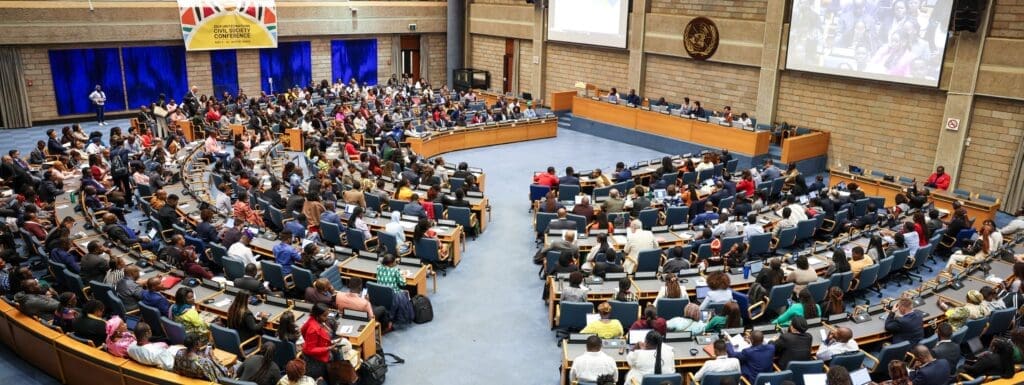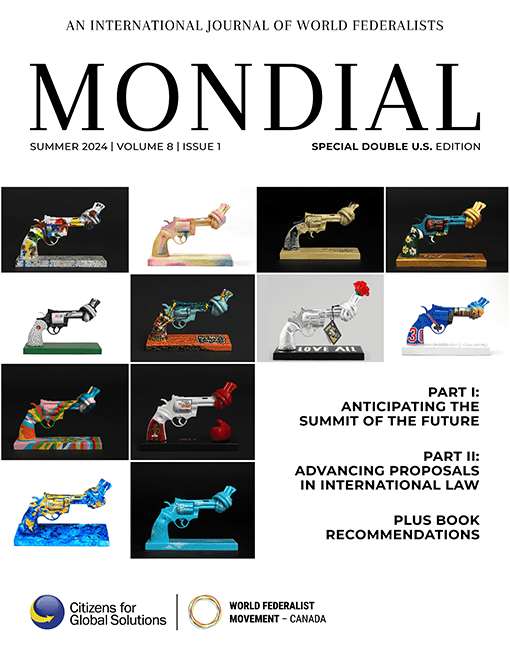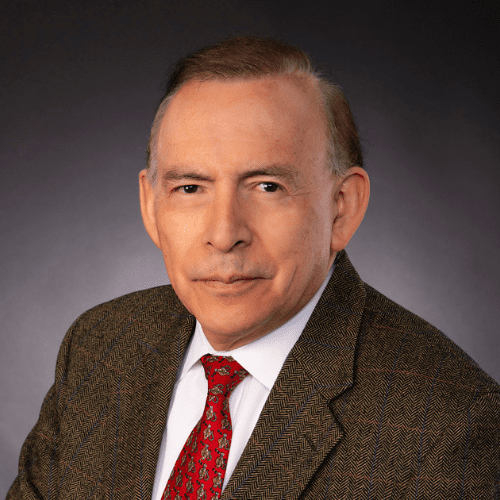Mondial Article (Summer 2024)
The Pact for the Future:
Steps Toward a Modernized United Nation

Fergus Watt
Fergus Watt served for 36 years as Executive Director of the World Federalist Movement – Canada and acts as Coordinator of the Coalition for the UN We Need (C4UN), serving on the Secretariat.
Can the United Nations (UN) adapt to the challenges of the 21st century? On September 22-23, 2024, the UN will convene the Summit of the Future in New York to reach a new global consensus on how we can improve the present system and safeguard the future. One of the Summit’s key outcomes will be the Pact for the Future, which will address five crucial areas: sustainable development and financing, international peace and security, science and technology, youth and future generations, and transforming global governance.
How Did We Get Here?
Efforts to reform the UN are rare, with the last major attempt led by Kofi Annan in 2005. In 2015, the Albright-Gambari Commission, supported by the Hague Institute for Global Justice and the Stimson Center, recommended using the UN’s 75th anniversary in 2020 as a catalyst for strengthening global governance. The World Federalist Movement – Canada (WFM-Canada) and various civil society networks seized this idea, initiating a series of consultations in New York, beginning in 2017.
The push for strengthening global governance gained momentum amid declining international cooperation and funding cuts at the UN, notably under the Trump administration. These challenges inadvertently fueled the drive for reform. By 2020, the UN 75 Declaration identified 12 action areas, setting the stage for the Secretary-General’s “Our Common Agenda” report in 2021, which proposed more than 90 recommendations and suggested holding the Summit of the Future.
Preparing for the summit of the future
The preparatory process for the Summit has been complex, often influenced by geopolitical tensions. Different state perspectives on issues such as human rights and environmental governance have made achieving consensus difficult. Despite these challenges, recent consultations and conferences, such as the UN Civil Society Conference in Nairobi, show a growing engagement and optimism for ambitious outcomes.
Key Recommendations in the Pact for the Future:
The current draft of the proposed Pact presents 52 “Action” paragraphs, each underpinned by concrete Commitments. These Actions are divided into five categories:
Sustainable Development and Financing
- Expedite the implementation of an Sustainable Development Goal (SDG) Stimulus.
- Strengthen tax cooperation among Member States, including through a UN tax convention.
- Secure ambitious outcomes on social development financing and convene a 2025 World Social Summit.
- Improve climate finance and sustainable development finance.
- Consider an ambitious post-2030 framework for sustainable development, calling for a Sustainable Development Summit in 2027.
International Peace and Security
- Analyze the impact of military expenditure on SDGs.
- Adapt UN peace operations by emphasizing a greater role for regional organizations.
- Ensure sustainable financing for African Union-led peace operations.
- Revitalize the UN’s role in disarmament – a fourth Special Session for Disarmament is called for.
Science, Technology, and Innovation
- Introduce the Global Digital Compact to set principles for cyberspace governance.
- Support international artificial intelligence governance with the UN playing a central, norm-setting role.
Youth and Future Generations
- Appoint a Special Envoy for Future Generations.
- Establish an annual forum to review the Declaration on Future Generations.
- Ensure long-term thinking and intergenerational equity.
Transforming Global Governance
- Reform the Security Council and revitalize the General Assembly. Note: Discussions among Member States started late on these two topics and are still under discussion at time of writing.
- Enhance the role of the Economic and Social Council and the Commission on the Status of Women.
- Strengthen the international financial architecture to mobilize capital for SDGs and climate challenges and to reduce structural imbalances that disadvantage less-wealthy states.
- Increase engagement with stakeholders, including local and regional authorities.
The discussions on UN reform are not isolated from global geopolitical tensions. The US aims to consolidate modest reforms, while a group of states, primarily from the G77, prioritize advancing the SDGs and reforming the international financial architecture. These governments also emphasize the intergovernmental nature of the UN and are wary of extensive civil society involvement. The current draft Pact’s treatment of human rights and environmental governance as “cross-cutting issues,” rather than standalone chapters, reflects these tensions.
The Role of Civil Society
Civil society has become deeply engaged in the global governance reform process, more so than during previous reform efforts. The involvement of civil society in institutional questions of global governance is now taking root globally, not just within the “New York bubble.” The May 2024 Nairobi conference highlighted this dynamic, demonstrating the broad interest and engagement of civil society organizations in strengthening the UN.

The UN Civil Society Conference in Nairobi, Kenya, brought together 2,158 civil society representatives; 317 officials from Member States, international organizations, and the UN system; 67 media representatives; and 47 volunteers from 115 countries.
Credit: UNIS Nairobi.
Future Prospects – Looking Beyond the Pact for the Future
The current draft of the Pact for the Future represents a modest yet crucial step towards modernizing and strengthening the UN. And who knows? The ongoing upcoming negotiations in New York hold the potential for surprising breakthroughs. The engagement of civil society and the ongoing consultations indicate a positive trajectory, suggesting that the Summit of the Future could yet lead to more meaningful and ambitious outcomes.
To ensure that the promises made in the Pact for the Future result in actionable steps taken by Member States, international organizations and their partners must ensure that the Pact’s key Actions and commitments are supported directly by concurrent implementation efforts, backed-up by clear benchmarks and monitoring mechanisms. Only through such dedicated and sustained efforts can we hope to realize a future where the UN is fully equipped to address the multifaceted challenges of the 21st century, creating a more just, peaceful, and sustainable world for all.
Mondial is published by the Citizens for Global Solutions (CGS) and World Federalist Movement — Canada (WFM-Canada), non-profit, non-partisan, and non-governmental Member Organizations of the World Federalist Movement-Institute for Government Policy (WFM-IGP). Mondial seeks to provide a forum for diverse voices and opinions on topics related to democratic world federation. The views expressed by contributing authors herein do not necessarily reflect the organizational positions of CGS or WFM-Canada, or those of the Masthead membership.



























